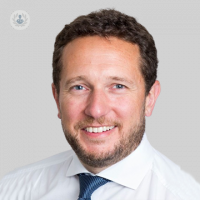Cochlear implants: is hearing fully restored?
Written in association with:Cochlear implants are a really exciting invention in ear nose and throat surgery in the last 30 years. They enable patients that have profound hearing loss to go from not being able to hear anything to communicating normally and being able to work. Children that have profound hearing loss can go to normal schools and develop normal language. Leading otolaryngologist and ENT surgeon Professor Simon Lloyd explains what it sounds like when you have a cochlear implant fitted…

What does a cochlear implant sound like?
The sound that you get from a cochlear implant is slightly different to natural sound. In the beginning, it sounds quite electronic and some people describe it a little bit like 'Mickey Mouse', but over the first three months of use, the implant starts to sound much more natural. In children that are implanted at a very young age, the hearing sounds almost like normal hearing for day-to-day sounds like speech and environmental noise.
The implant has a slight limitation with music because the electronics within the processor of the implant isn't capable of processing the complexity of the music. Often people say that the quality of music isn't very good through a cochlear implant.
Read more: how do cochlear implants work?
What’s the difference between a hearing aid and a cochlear implant?
A hearing aid essentially amplifies the patient's own hearing, whereas a cochlear implant electrically stimulates the hearing pathways of the brain, which is the main difference between the two.
What’s the best age to have the implant fitted?
There are two main groups of patients that get cochlear implants: children that are born with profound deafness and adults that have developed speech and had normal hearing but then developed deafness later on in life.
With children who are born with profound deafness, it's really important that they're implanted before the age of four or five because if they don’t receive auditory stimulation the brain isn't able to use the sounds that it receives. Adults can be implanted at any age, essentially even 10 or 20 years after the development of the profound deafness.
Is hearing restored back to normal?
Hearing isn't quite restored back to normal with a cochlear implant. There are several different elements to hearing with understanding speech as probably the most important one. If you were able to score hearing from 0 to 100, somebody that's profoundly deaf would score 0 and somebody with normal hearing would score 100. A cochlear implant user would score about 70% or 80% in a quiet environment. Where they might struggle a little bit more is in a noisy environment and the average score probably in noise is around 60% to 70%.
If you are interested in cochlear implants for you or a loved one, do not hesitate to book an appointment with a specialist.


